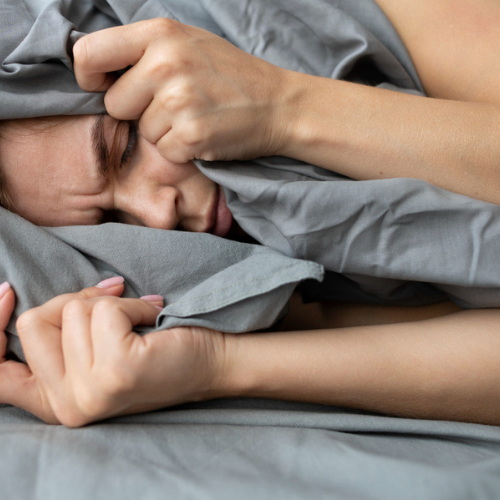Sleep plays a vital role in maintaining complete mental health. Sleep deprivation can have profound effects on mental health and may lead to serious conditions like anxiety and depression. Sleep deprivation can cause anxiety, and overlooking anxiety treatment can upset your sleep. Quality sleep is important for mental and physical health. If you have ever been sleep deprived, you know how the next day may leave you feeling troubled and annoyed.
Description
At least 7 hours of quality sleep are recommended for adults to maintain good health. Anything less can have negative health impacts, like anxiety and depression.
If you keep yourself awake or can’t fall or remain asleep, you may be suffering from an anxiety or sleep disorder. However, there are a few things you can do to reduce anxiety and sleep better.
Are Sleep And Anxiety Interconnected?
Anxiety and sleep disorders are inextricably interrelated. Suffering from sleep disorders leads to anxiety issues. Anxious people normally have sleep problems. People with anxiety often experience difficulty falling or staying asleep, leading to sleep deprivation.
Equally, sleep deprivation can exacerbate existing anxiety symptoms or even trigger anxiety disorders in humans without any history of anxiety. As per research, when you don’t get enough quality sleep, your body releases more cortisol (a stress hormone).
Excess cortisol release results in unpleasant symptoms like headaches or stomach aches, which can make you feel anxious or give you low energy due to bad sleep. The more activated your nervous system is, the harder it is to fall asleep.
Is Sleep Deprivation a Cause of anxiety and depression?
If you have ever had a lousy night’s sleep, you may feel anxious the next day. According to recent research, a lack of sleep might cause irritation.
These are the prime areas of the brain associated with anxiety disorders.
These are some bad effects for a person who has high levels of anxiety that are built into their nature. Sleep deprivation isn’t necessarily associated with improved anxiety. However, the study reveals that people who are already anxious by nature may experience an increase in anxiety when they are short on sleep.
Can Sleep Deprivation Lead To Panic Attacks?
A lack of sleep can contribute to panic attacks when combined with other anxiety risk factors. A panic attack is an unexpected condition of acute fear or worry. Humans with bad sleep are more prone to unnecessary physical changes linked to nervous system activation.
People breathe shallower and more rapidly when the nervous system is activated, and this sudden change in breathing might initiate a panic attack if the person is prone to panic attacks.
How To Overcome Lack Of Sleep And Anxiety
There are a number of ways to reduce worry and stress and improve sleep quality. A disciplined lifestyle, quality sleep, and regular workouts may help overcome sleep and anxiety disorders. Consider the below suggestions:
Creating A Bedtime Routine
Every day, getting up and going to bed at the same time may reduce sleeping disorders. Try to get the necessary 7 to 10 hours of quality sleep per night and body-relaxing exercise before bedtime by taking a warm bath or reading a book.
Make Your Room Sleep-friendly.
Sleeping in a cool, dark, and quiet room elevates sleep quality. To drown out any noise, use a fan or sound machine, and make sure your mattress and pillows are comfortable for a good night’s sleep.
Do Regular exercise.
Daily exercise is beneficial to your physical and mental health. It also helps with the release of endorphins. Yoga or bodyweight exercises have been shown to alleviate anxiety and tension. Try to fix your workout for the morning session after a good sleep.
Conclusion:
The link between sleep deprivation, anxiety, and depression is well established. Poor sleep quality can contribute to sleep and mental health issues in the long run. Knowing the interconnectedness of sleep and mental health is crucial for maintaining overall mental and physical health.
